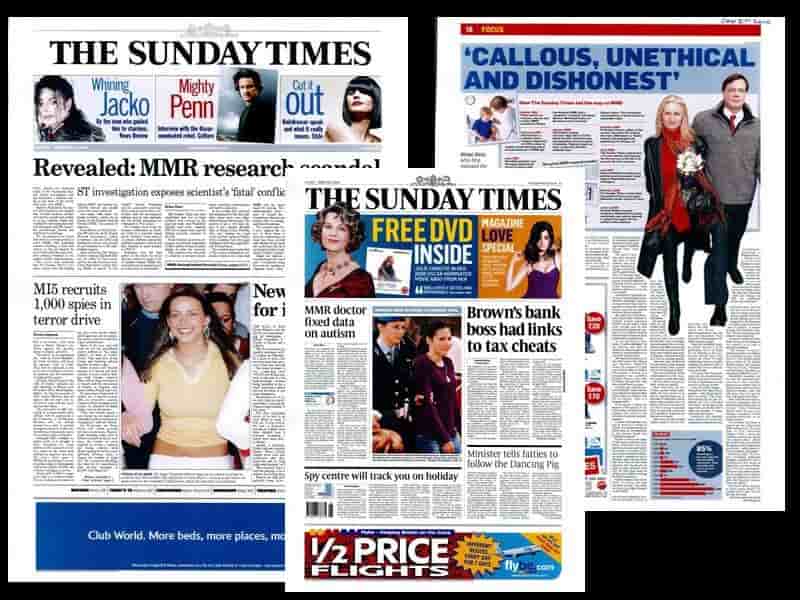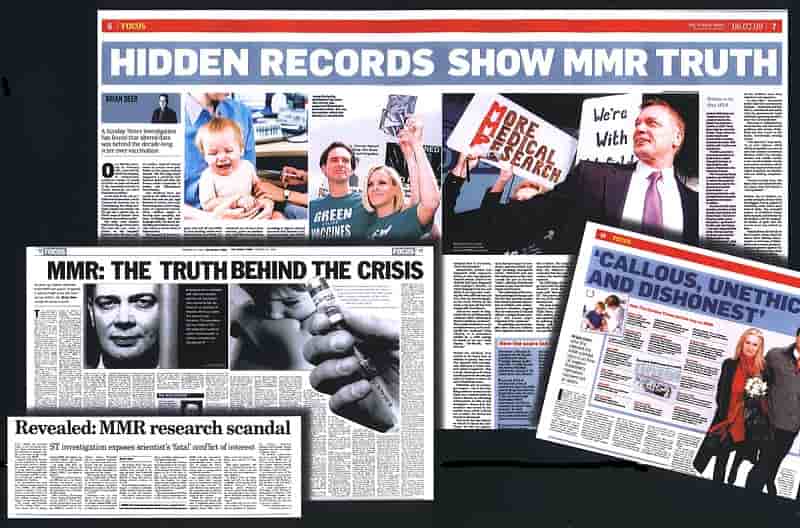Reprint
![]()
MMR scandal’s biggest victim: 1,400 Swansea children may catch measles.
Brian Deer reveals how a rogue doctor sparked the health crisis
The Sunday Times, April 14 2013
LAST month a story appeared in the South Wales Evening Post. A father, stricken with guilt over not vaccinating his daughter against measles, was trying to convey the consequences to other parents.
Craig Thomas’s daughter Chloe, 15, was in a “really, really bad” way and one of his two sons was also coming down with measles, the Swansea-based newspaper reported.
He and Nicola Malcolm, Chloe’s mother, “felt terrible that they had chosen not to give her the MMR vaccine when she was a youngster as a result of information they read about at the time”.
Chloe was one of more than 16 pupils from the city’s Morriston comprehensive school to have gone down with the virus.
READ HOW DEER’S WAKEFIELD
INVESTIGATION WAS CHECKED
What the newspaper did not mention in its reporting of the case, however, was its own role — and that of local solicitors — in helping to leave Swansea with the kind of public health crisis that can result when a city turns its back on mass immunisation.
This weekend the total number of cases in the outbreak, centred on the city, was close to 700. Some experts fear it could double as children return to school this week after the Easter holidays.
As many as 40,000 children across Wales have not been vaccinated with MMR. Meirion Evans, of Public Health Wales, said nowhere in the principality is safe from measles, adding: “I think that is true of the UK as a whole.”
The allegation that the MMR vaccine caused autism, promoted by a now-disgraced former doctor, Andrew Wakefield, was the medical horror story of the late 1990s.
Several national newspapers took up the cause, but the South Wales Evening Post frightened its readers like no other tabloid.
Starting in summer 1997, it ran a series of stories with emotive headlines such as “Tot’s smiles faded after jabs”, “Parents cry for answers” and “Stop giving our children jabs”.
So intense was the Evening Post’s reporting of the supposed dangers of the MMR jab that numbers vaccinated fell by 13.6% over a year within its circulation area — against 2.4% in Wales as a whole. Swansea was saying no to MMR.
Scientists who analysed the impact of the campaign in a paper published in 2000 concluded that it had had “a measurable and unhelpful impact over and above any adverse national publicity”.
The newspaper’s first big story concerned a boy named Ben M, aged 4, from Sketty, west of Swansea.
His mother said he had been given an MMR jab at the age of 15 months — which was when his problems had started.
“Months later he developed autism,” the paper reported her as telling it in a front page story in August 1997.
Ben M was not any child, however. He was one of a cohort recruited by Wakefield, who in February of the previous year had been hired by Richard Barr, a Norfolk lawyer, to launch a speculative product liability lawsuit.
Ben M was written up, albeit only in a statistic, in Wakefield’s most infamous and discredited paper. Also published in The Lancet, in February 1998, it showcased 12 children said to have bowel and brain problems, the first signs of which emerged only days after receiving the MMR vaccine.
As a Sunday Times investigation revealed, the exercise was a set-up, with litigants coming to the Royal Free Hospital, in north London, out of which the project was run, to make their claims. These were then written up by Wakefield as if they were the voices of routine patients’ families, fooling parents and journalists alike.
“Stop giving our children jabs,” shouted a front page headline in the Evening Post on February 27, 1998, setting out Wakefield’s allegations. “Autism fears over vaccine.”
Inside that day’s edition, Barr was introduced, although his relationship with Wakefield was not explained. This would only be revealed, years later, by our inquiries.
The Evening Post also quoted a local law firm, Smith Llewellyn, suggesting what ought to happen next. “The way forward in this case now is for more parents who believe their children may have been injured to come forward and seek legal advice,” said solicitor Michael Green.
Come forward they did. Recruitment in the south Wales valleys was swift.
By the time the lawsuit failed for lack of evidence in 2003, Green’s firm was in vaccine clover. It had raised more High Court MMR claims from a single community than any other local law firm in Britain.
No wonder parents’ fears spread like an infection around Swansea, as his firm’s clients told neighbours and friends. And no wonder a real infection would one day take hold.
Green, who has since left Smith Llewellyn, declined last week to comment, saying merely: “I was a very junior solicitor at the time. I was an employee doing what employees do.”
Jonathan Roberts, the newspaper’s current editor, defended its stance. “Our campaign reflected the concerns of parents, it told their stories, it called for answers, it wanted clarity,” he said. “What it did not do was tell people to avoid immunising their children against measles — or mumps, or rubella.”
Wakefield, who was struck off the medical register by the General Medical Council in 2010, has continued to wage his campaign against MMR from his new home in America.
On his website, he accused the government of causing the epidemic by stopping the import of a vaccine that acted against measles only.
Government officials “put price before children’s health and have been seeking to cover up this shameful fact ever since”, he claimed.
The Department of Health dismissed Wakefield’s claims as completely incorrect. It appealed to parents of children who have not had two doses of MMR to contact their GP.
Additional reporting: Nic North
Doctor discredited
The fraudulent research at the heart of the worldwide scare over MMR was exposed by Brian Deer in The Sunday Times in 2004. The co-authors of Wakefield’s paper claiming a possible link between MMR and autism dissociated themselves from it and vaccination rates began to climb steadily.



